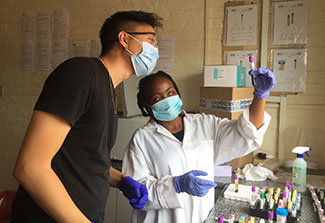Profile: Dr Andrew Kim studies the impact of apartheid-based prenatal stress and COVID-19 in South Africa
January / February 2021 | Volume 20 Number 1
By Susan Scutti
During the first six weeks of South Africa’s pandemic lockdown, Fogarty Fellow Dr. Andrew Kim and his research team surveyed 220 Soweto adults about the mental health impacts of COVID-19. Respondents who perceived themselves at high risk of contracting the new coronavirus experienced more severe symptoms of depression, while one in four reported increased anxiety, fear of infection or “thinking too much,” the researchers found.

The biological anthropologist had never conceived of such a study back in August 2019 when he moved to Johannesburg and began the groundwork for his core Fogarty project, an examination of intergenerational effects of apartheid-based prenatal stress on birth outcomes, neuroendocrine function, and mental illness risk across subsequent generations. His research is based on a 30-year longitudinal birth cohort study conducted in 1990 in Soweto at the time of the dissolution of the apartheid regime, explained Kim. The original researchers examined the effects of apartheid on 3,000 pregnant women with funding from the South African Medical Research Council. The mothers and their children now span three generations. “I am doing a follow-up on 250 mother-child pairs of the second and third generations," said Kim.
Until mid-March 2020, his follow-up study was “running strong" but then the pandemic forced a stop to the work. Disappointment soon gave way to inspiration. “I realized this is an important opportunity to assess how people are affected by something as drastic as a lockdown and global pandemic," said Kim. He hypothesized that the adversity of a pandemic would compound ongoing histories of HIV, unemployment, poverty and racism. “Growing research suggests that past experiences of stress and trauma - especially during early periods of development - predispose you to worse reactions to stress in the future as well as greater risk for mental and physical illnesses," he said. “I wrote a quick ethics revision and shifted my Fogarty project to a telephone interview basis, where we called people asking their experiences in the lockdown."
Kim's desire to continue working in South Africa despite the pandemic was also fueled by an “ethical obligation" to support his research assistants, whom he'd already trained in survey data collection, interview technique, biomarker sample collection, and project administration. During lockdown, he provided psychoeducation for his team to help them cope.
While gearing up the COVID-19 project, Kim was able to analyze existing data to see how prenatal stress from apartheid affected health outcomes intergenerationally. He discovered younger women who experienced greater levels of stress and trauma during apartheid while pregnant had children with greater levels of psychiatric morbidity at 17 years old, said Kim. “Younger maternal age and greater levels of social adversity were perpetuating a stronger association between prenatal stress and late adolescent or earlier adulthood psychiatric risk."
His Fogarty fellowship gave him new insights and helped him grow scientifically. “Doing long-term immersive research is very important when you don't know the context in which you're working and is very much a part of anthropology," said Kim. He believes his connection with other Fogarty fellows has also helped him advance scientifically through special monthly development webinars and other sessions on relevant research topics. His gratitude to Fogarty includes providing him with a greater sense of confidence and the ability to visualize a long-term career that includes global health research.
His advice for others is uncomplicated. “If you really are interested in doing this capacity building work, you have to be both patient and tenacious and know your place. You need to realize the best ways for you to assist in a context where you are a guest."
More Information
To view Adobe PDF files,
download current, free accessible plug-ins from Adobe's website.
Related Fogarty Programs
Related World Regions / Countries
Related Global Health Research Topics